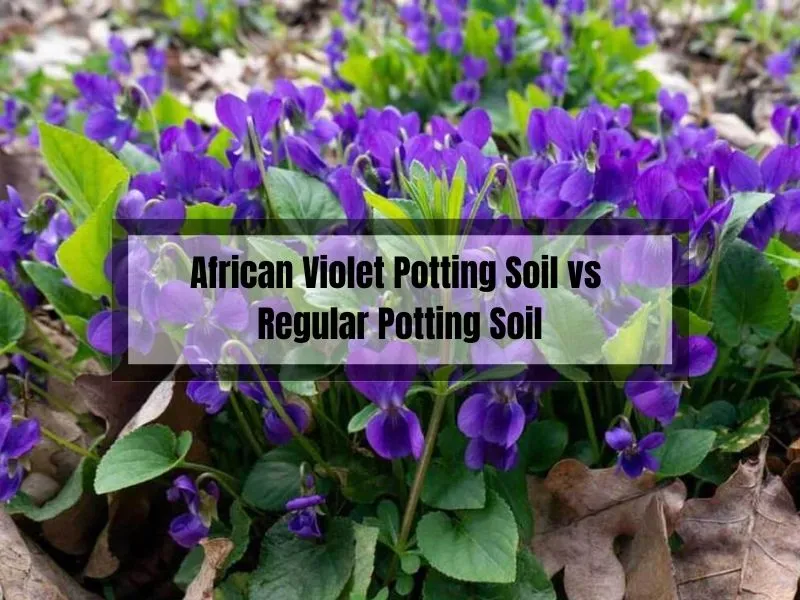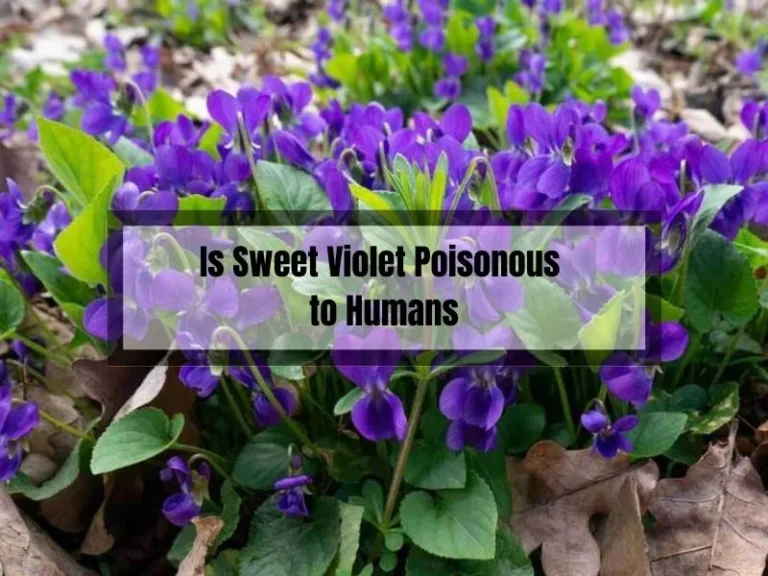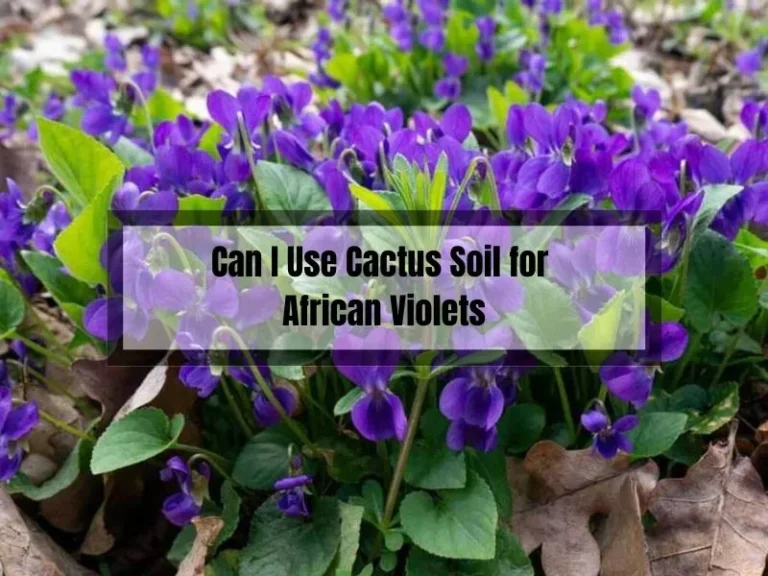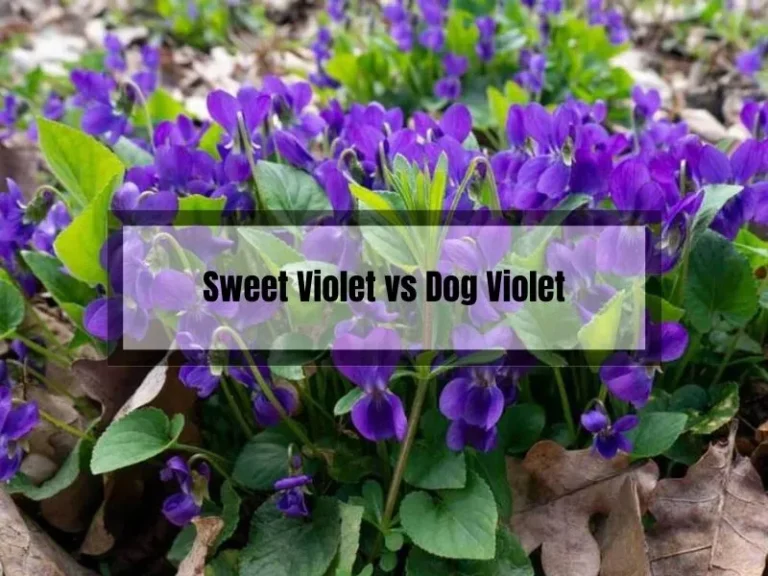African Violet Potting Soil vs Regular Potting Soil: Which is Better for Your Plants?
From Louise: Passionate about gardening, I specialize in plant care and flower knowledge. I’m here to share my expertise and assist with your gardening queries. Feel free to ask any questions or seek advice on lawn care—I’ll respond within 24 hours!
When it comes to gardening, choosing the right potting soil is essential for the growth and health of your plants. But with so many different types of soil available, how do you know which one to choose?
If you’re growing African violets, the answer is simple: specialized African violet potting soil.
In this article, you’ll learn about the differences between African violet potting soil and regular potting soil, and why choosing the right soil for your African violets is crucial for their growth and overall health.
Key Takeaways
- African violet potting soil is specially formulated to meet the specific needs of these plants, which require a slightly acidic environment to grow properly.
- Regular potting soil is designed for a broad range of plants and may not provide the ideal conditions for African violets.
- Choosing the right soil for your African violets can make all the difference in their growth and overall health.

African Violet Potting Soil vs Regular Potting Soil
When it comes to growing African violets, choosing the right soil is crucial. African violet potting soil and regular potting soil have significant differences that can affect the growth and health of your plants.
pH Levels
One of the biggest differences between African violet potting soil and regular potting soil is the pH level.
African violets prefer slightly acidic soil, with a pH range of 5.8 to 6.5. Regular potting soil, on the other hand, tends to have a neutral pH level around 7.0.
Using regular potting soil for your African violets may cause the plant to struggle to absorb nutrients and ultimately lead to poor growth.
Ingredients
Another difference between African violet potting soil and regular potting soil is the ingredients used in each mix.
African violet potting soil typically contains a mix of peat moss, vermiculite, and perlite. These ingredients help to create a lightweight, well-draining soil that is perfect for African violets.
Regular potting soil, on the other hand, may contain a mix of peat moss, compost, and other organic materials.
Moisture Retention
African violets require a well-draining soil that allows excess water to escape quickly. African violet potting soil is specifically designed to retain moisture while also allowing for proper drainage.
Regular potting soil may not be as effective at retaining moisture, which can lead to overwatering and root rot.
Understanding Potting Soil
African Violet Potting Soil
If you’re planning on growing African violets, then African violet potting soil is the way to go. This type of soil is specifically formulated to meet the unique needs of African violets.
African violet potting soil is typically more acidic than regular potting soil, with a pH level of around 5.5 to 6.5. This is because African violets prefer slightly acidic soil, which allows them to absorb nutrients more easily.
In addition to being more acidic, African violet potting soil is also typically lighter and fluffier than regular potting soil. This is because African violets have delicate roots that can be easily damaged by heavy or compacted soil.
African violet potting soil is designed to be well-draining, which helps prevent water from pooling around the roots and causing root rot.
Regular Potting Soil
Regular potting soil is designed to be a general-purpose soil that can be used for a wide variety of plants. This type of soil typically has a pH level that is closer to neutral, around 7.0.
While this may work for many other plants, it’s not ideal for African violets, which require a more acidic soil. In addition to having a higher pH level, regular potting soil is also typically denser and heavier than African violet potting soil.
This can make it more difficult for African violets to grow and thrive, as their delicate roots may struggle to penetrate the soil and access the nutrients they need.
Choosing the Right Soil
When it comes to choosing the right soil for your plants, it’s important to consider the specific needs of each plant.
While regular potting soil may work for some plants, it’s important to choose African violet potting soil if you want your African violets to thrive.
By using the right soil, you can ensure that your plants have access to the nutrients and growing conditions they need to stay healthy and vibrant.
Related Posts:
- Can You Really Use Cactus Soil for African Violets? Expert Advice for Healthy Growth
- Discover the Winner: Raised Bed Soil vs Topsoil for Your Dream Garden
- How to Improve Lawn Soil Naturally: Expert Tips and Methods
Benefits of African Violet Potting Soil
If you want your African violets to grow healthy and vibrant, using the right potting soil is crucial. Here are some benefits of using African violet potting soil:
1. Optimal pH Level
African violet potting soil has the right pH level for these plants. African violets thrive in soil with a pH level between 5.8 and 6.2.
Using regular potting soil can lead to nutrient deficiencies and other problems because it often has a pH level that is too high.
2. Proper Drainage
African violet potting soil provides proper drainage, which is essential for preventing root rot and other issues.
The soil is usually a blend of peat moss, vermiculite, and perlite, which allows for good airflow and drainage.
3. Nutrient-Rich
African violet potting soil is typically enriched with nutrients that are essential for the growth and health of these plants.
The soil may contain ingredients like bone meal, blood meal, and other organic materials that provide the necessary nutrients for healthy growth.
4. Disease Prevention
African violet potting soil is often sterilized to prevent the growth of harmful bacteria and fungi that can cause disease in these plants. Using regular potting soil can increase the risk of disease and other problems.
Overall, using African violet potting soil is the best way to ensure that your African violets thrive and remain healthy. While it may be tempting to use regular potting soil to save money, doing so can lead to problems and ultimately cost you more in the long run.
Related Posts:
- Overwatering Houseplants: How to Avoid Killing Your Plants
- Are You Guilty of Underwatering Your Plants? Learn the Impact and Solutions
- Root Rot in Plants: Causes, Symptoms, and Treatment
Drawbacks of Regular Potting Soil
When it comes to growing African Violets, using regular potting soil can have some drawbacks. Here are a few reasons why:
- Poor drainage: Regular potting soil can hold too much moisture, which can lead to root rot. African Violets prefer well-draining soil that allows water to flow through easily.
- Lack of nutrients: Regular potting soil may not have all the nutrients that African Violets need to thrive. This can result in stunted growth, poor flowering, and a weakened immune system.
- pH imbalance: African Violets prefer slightly acidic soil with a pH between 5.5 and 6.5. Regular potting soil may have a higher pH, which can lead to nutrient deficiencies and other problems.
- Compaction: Regular potting soil can become compacted over time, making it difficult for roots to grow and absorb nutrients. This can lead to stunted growth and other problems.
Overall, while regular potting soil may work for some plants, it may not be the best choice for African Violets. Using a potting mix specifically designed for African Violets can help ensure that your plants get the nutrients and growing conditions they need to thrive.
Choosing the Right Soil for Your African Violets
Factors to Consider
When it comes to choosing soil for your African violets, there are several factors to consider. One of the most important factors is drainage.
African violets need soil that is well-draining to prevent water from accumulating around their roots, which can lead to root rot. At the same time, the soil should retain enough moisture to keep the plant hydrated.
Another important factor to consider is the nutrient content of the soil. African violets require a balanced ratio of nitrogen, phosphorus, and potassium to support healthy growth and flowering. A good guideline is a 14-12-14 or similar ratio.
Additionally, the pH level of the soil is important. African violets prefer slightly acidic soil with a pH between 6.2 and 6.5.
Expert Recommendations
According to gardening experts, the best soil for African violets is a mixture that is well-draining, porous, and fertile. A good mix should include a combination of peat moss, vermiculite, and perlite. Perlite is a lightweight material that retains moisture without impeding drainage, while vermiculite helps to hold water and nutrients.
If you prefer to purchase pre-made soil, look for a mix that is specifically formulated for African violets. These mixes often contain a blend of peat moss, vermiculite, and perlite, as well as additional nutrients.
Remember, the right soil is crucial for the health and vitality of your African violets. By considering factors such as drainage, nutrient content, and pH level, you can ensure that your plants thrive.
FAQs
Can African violets grow in regular potting soil?
While African violets can grow in regular potting soil, they may not thrive due to the difference in pH and drainage. To give your African violets the best chance at success, use a potting mix specifically designed for these plants or adjust regular potting soil as described above.
How often should I repot my African violets?
African violets generally benefit from being repotted every 6 to 12 months. This allows you to refresh the potting mix and ensure your plants have plenty of room to grow.
How do I know if my African violet needs a more acidic soil?
If your African violet is struggling to grow or has yellowing leaves, it may be a sign that the soil pH is too high. Test the pH of your soil and, if necessary, adjust it to make it more acidic.
Can I use regular potting soil for other acid-loving plants?
Yes, you can use regular potting soil for other acid-loving plants, such as azaleas, rhododendrons, and blueberries, as long as you adjust the pH and drainage as needed. Keep in mind that each plant may have slightly different requirements, so always research the specific needs of your acid-loving plants to ensure their success.
Conclusion
To sum up, African violet potting soil is specially formulated to meet the specific needs of these plants, which require a slightly acidic environment to grow properly. Regular potting soil is designed for a broad range of plants and may not provide the ideal conditions for African violets.
The light acidity in African violet potting soil is fine for most plants, but alkaline or high pH-loving plants may suffer in acidic soils. In these cases, the soil can often be brought to more neutral pH by adding compost, and the extra organic matter will certainly help most any other plant thrive.
When it comes to growing African violets, it is essential to create the optimal environment for them to flourish. The key is to understand their preferences and provide them with the right soil, drainage, and nutrient content.
Don’t hesitate to experiment with soil amendments and adjustments to find the perfect potting mix for your African violets. With a bit of patience and attention, you’ll be rewarded with gorgeous blooms and lush foliage that bring joy to your home. Happy gardening!
Related Posts:



